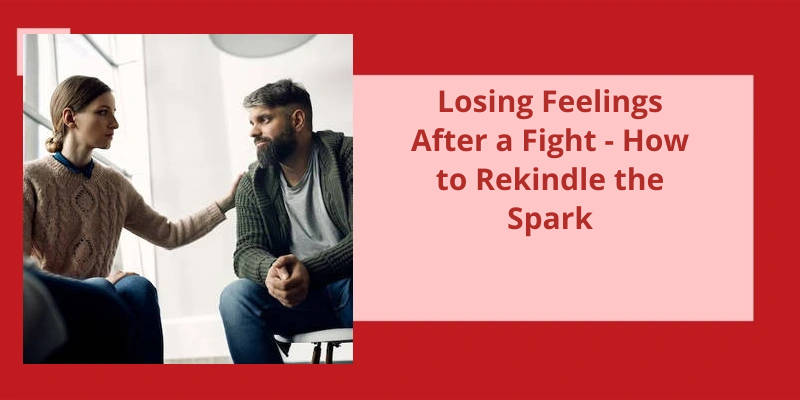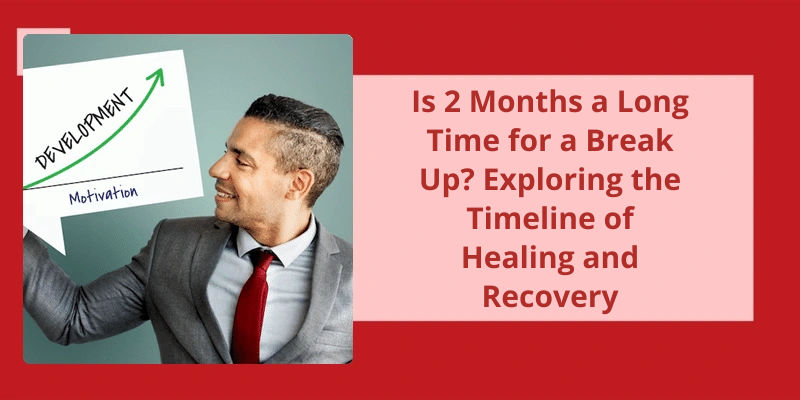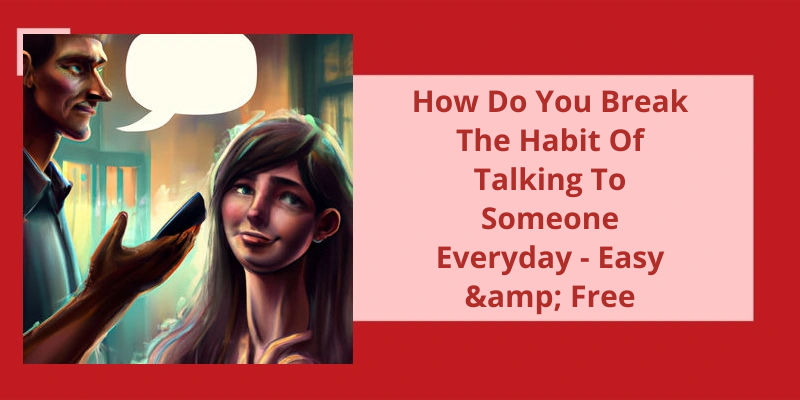They may start questioning their compatibility, the strength of their bond, and even if they should continue their relationship. It's a difficult and vulnerable time, where emotions are heightened and doubts consume the mind. But it's important to remember that losing feelings after a fight is a common occurrence and can happen to anyone. It’s a natural response to conflict and the stress it brings. However, it doesn't have to be the end of the road for your relationship. With patience, understanding, and a willingness to work through the aftermath of a fight, you can rekindle the spark and rebuild the connection you once had.
How Do I Get My Feelings Back After a Fight?
When a couple is in the midst of a fight, it’s common for emotions to run high and for feelings to dissipate. That sense of closeness and connection can be easily lost in the heat of the moment, leaving both partners feeling distant and disconnected. However, there are several ways to rekindle the spark and bring back those lost feelings.
Firstly, it’s important to give each other time and space after a fight. This allows both partners to cool down and reflect on the argument. During this time, it’s crucial to feel your feelings and process them individually. This will help you gain a better understanding of your emotions and pave the way for healing.
Using “I” statements is another effective tool for repairing a relationship after a fight. This involves expressing your feelings and concerns using non-confrontational language. By focusing on your own emotions instead of blaming your partner, you create a safer and more open environment for communication.
Actively listening to your partner is also essential in rebuilding a connection. It’s crucial to give them your undivided attention, allowing them to express themselves fully without interruption or judgment. This demonstrates empathy and shows that you value their perspective, helping to rebuild trust and intimacy.
If the tension is still high and emotions are running rampant, taking a break can be beneficial. Sometimes, stepping away from the situation for a short period of time can provide clarity and help both partners gain a fresh perspective. This break should be used constructively, with the intention of coming back together to resolve the issues at hand.
Apologizing and reconnecting is an important step towards repairing a relationship after a fight. Taking responsibility for your actions and acknowledging the hurt caused can go a long way in rebuilding trust and restoring emotional connection. Expressing remorse and actively working towards mending the relationship is crucial.
Finally, making a plan for the future can help rekindle the spark. This involves discussing how to prevent similar arguments in the future, and creating strategies to resolve conflicts in a healthier and more constructive way. By establishing a clear plan, both partners can feel reassured that the relationship is moving forward towards a more positive and fulfilling future.
Building Trust and Rebuilding Intimacy After a Fight
- Take time to cool down and reflect on the situation.
- Communicate openly and honestly about your feelings and concerns.
- Show empathy and understanding towards your partner’s perspective.
- Apologize sincerely if you were in the wrong.
- Practice active listening and validate each other’s emotions.
- Find and implement healthy conflict resolution strategies.
- Work together to rebuild trust and establish new boundaries.
- Engage in activities that promote bonding and reconnecting.
- Seek professional help or couple’s therapy if needed.
- Continually express love, appreciation, and affection for each other.
In such situations, it can be healthy and beneficial to give space in a relationship after a fight. Avoiding clinginess allows both partners to process their emotions and thoughts independently, fostering personal growth and introspection. This time apart can ultimately lead to a stronger and more understanding connection in the long run. Clinging, on the other hand, might exacerbate the situation and hinder the necessary time and space needed for healing.
Is It Good to Give Space in a Relationship After a Fight?
Is it good to give space in a relationship after a fight? The answer may vary depending on the individuals involved, but giving space can often be beneficial. Avoid clinging: In the aftermath of a fight, it’s natural for one partner to desire some alone time, while the other may feel clingy and desire closeness. While it may feel satisfying to have your partner nearby, it’s important to recognize and respect their need for space. Granting this time can allow both partners to reflect on the situation and their own emotions, ultimately leading to a stronger and healthier relationship. On the contrary, clinging onto your partner can potentially exacerbate the issue, making it difficult for them to take the necessary time out.
Time for reflection: When emotions are running high after a fight, it’s crucial for both partners to have the opportunity to reflect on the argument. Giving space allows each individual to process their own thoughts and feelings without the influence or pressure of their partner. It enables them to gain clarity, understand their own emotions better, and potentially consider alternate perspectives. By providing this time for reflection, you create an environment where both partners can approach the issue with a calmer mindset and work towards a resolution with greater understanding and empathy.
Recharge and regroup: Fights can be emotionally draining, and both partners may need some time to recharge and regroup. This period of space allows for emotional healing and restoration. It can give individuals the opportunity to engage in self-care activities that help them to relax and find balance within themselves. By taking this time to recharge, both partners can return to the relationship with a renewed sense of energy and focus.
It allows both partners to appreciate each others presence and the positive aspects of their relationship. The absence of constant contact can make the heart grow fonder, leading to a deeper appreciation of the relationship. Additionally, taking a step back from the intensity of a fight can remind both partners of the love and connection they share, and enable them to approach reconciliation with a fresh perspective.
Communication and understanding: It’s important to communicate openly about the need for space in a relationship after a fight. Expressing your desire for some time alone doesn’t mean that you love your partner any less. On the contrary, it shows that you value the relationship enough to give it the time and space it needs to heal. It’s equally crucial for the other partner to understand and respect this need, even if it may be challenging for them. Open and honest communication is key in navigating this delicate balance and rekindling the spark after a fight.
However, it’s important to note that losing feelings after a fight doesn’t necessarily mean the end of a relationship. In fact, it’s quite common for emotions to fluctuate during conflicts, and it may take time and effort to rebuild the connection. Understanding and addressing the underlying issues that led to the fight can help in regaining lost feelings and strengthening the bond between individuals.
Is It Normal to Lose Feelings After a Fight?
Is it normal to lose feelings after a fight? Absolutely. It’s completely natural for individuals to experience a decline in their feelings towards each other following a heated argument or a disagreement. The emotional toll of a fight can easily chip away at the spark that once ignited their connection. The negative emotions that arise during conflicts can overshadow positive emotions and diminish the overall interest in maintaining the relationship.
Rekindling the spark after a fight requires effort and commitment from both partners. It involves rebuilding trust, reconnecting emotionally, and finding ways to reignite the passion that once existed. This can be achieved through quality time spent together, engaging in activities that bring joy and laughter, and expressing genuine affection and appreciation for one another. It may also be helpful to seek outside support such as couples therapy or counseling to navigate through the aftermath of a fight and find effective strategies to rebuild the relationship.
The Role of Forgiveness in Rebuilding a Relationship After a Fight
Forgiveness plays a crucial role in rebuilding a relationship after a fight. When conflicts arise, negative emotions can cloud our judgment and cause us to lose sight of the love and connection we once had. However, without forgiveness, these wounds can fester and erode the foundation of the relationship, making it difficult to rekindle the spark.
By choosing to forgive, we let go of grudges and resentments, allowing healing and growth to take place. It gives us the opportunity to release the pain and move forward with a renewed sense of empathy and understanding. Through forgiveness, we open up space for compassion, which is essential for rebuilding trust and restoring the emotional bond that may have been damaged during the fight.
Forgiveness isn’t a one-time event; it’s a continuous process that requires effort and vulnerability from both partners. It involves acknowledging the hurt caused, expressing remorse, and actively working towards rebuilding the damaged areas of the relationship. In this process, open and honest communication is crucial, allowing both partners to express their feelings and needs without judgment.
Rekindling the spark after a fight requires patience, time, and a willingness to let go of old wounds. Forgiveness is a powerful tool that can pave the way for healing, growth, and a stronger, more resilient relationship.
Source: Because of the fights with my gf I’m losing feelings for her. I’m …
It’s common for people in relationships to experience a shift in feelings at some point, and it doesn’t always mean it’s time to call it quits. However, it’s essential to take the opportunity to evaluate whether or not the relationship is truly fulfilling. While having a conversation with your partner can be helpful, relationship expert McCullough suggests being open to the possibility of ending things if necessary.
Should You Break Up if You Lose Feelings?
Should you break up if you lose feelings? A sudden change in feelings doesn’t necessarily mean your relationship is over, but this could be a good time to reflect on if this relationship is actually working for you. It’s important to remember that relationships go through ups and downs, and losing feelings after a fight isn’t uncommon. However, if this is a recurring pattern and you constantly find yourself losing feelings, it may be worth considering if this relationship is truly fulfilling your emotional needs.
Although talking to your partner can help, McCullough said you should also be prepared to potentially end your relationship. Communication is key in any relationship, but sometimes, despite efforts to work through problems, the spark may not be rekindled. It’s important to have an honest and open conversation with your partner about your feelings and concerns. Listen to their perspective and try to understand where theyre coming from. However, it’s equally important to trust your own instincts and emotions. If, despite your best efforts, you still find yourself not able to regain those lost feelings, it may be a sign that this relationship is no longer serving you.
Breaking up is never easy, but it’s important to prioritize your own happiness and emotional well-being. It’s crucial to assess if this is a pattern or just a temporary setback. If this is a recurring problem, it may be time to question if this relationship is healthy and fulfilling for both partners. Taking time apart to reflect and evaluate your emotions is necessary in order to make a well-informed decision about the future of your relationship.
Rekindling the spark after losing feelings can be challenging, but it’s not impossible. It requires both partners to be willing to put in the effort and make necessary changes. This may involve engaging in activities that reignite the passion and emotional connection, such as going on dates, exploring new hobbies together, or seeking professional help from a couples therapist. However, it’s important to remember that rekindling the spark requires the genuine desire and commitment from both partners. If this effort is consistently one-sided, it may be a sign that the relationship isn’t worth salvaging.
However, it’s important to reflect on whether this relationship is truly meeting your emotional needs. Communication is key in addressing this issue with your partner, but be prepared to potentially end the relationship if efforts to rekindle the spark prove unsuccessful. Trust your instincts and prioritize your own happiness. Relationships require effort from both partners, and if the spark can’t be reignited, it may be time to consider moving on.
Healing from a broken heart is a journey that varies from person to person. The process of fully losing feelings can be influenced by factors such as the intensity of love, the commitment to cutting ties, and self-care practices. It’s important to remember that there’s no set timeline for healing, and allowing yourself the necessary time and space is crucial in moving forward.
Do You Ever Fully Lose Feelings?
Do you ever fully lose feelings? It’s a question that many people ponder after a fight or a breakup. The truth is, losing feelings for someone can take time. It’s a process that varies from person to person and can be influenced by a variety of factors.
For some, losing feelings can happen relatively quickly. In just a few weeks or months, they’re able to let go of the emotions they once had for their partner. This may be because they didnt have a deep emotional connection or because they prioritize their own healing process and cut all ties with their ex. By focusing on self-care and moving forward, they’re able to move on from the relationship and let go of any lingering feelings.
It may take years to fully let go of the love and emotions that were once present in the relationship. This could be because they’d a deep and intense connection with their partner that isn’t easily forgotten. It could also be due to unresolved issues or lingering feelings of hurt and pain from the fight or breakup. In these cases, it’s important to give yourself the time and space you need to heal.
One of the keys to losing feelings after a fight is to prioritize your own healing process. This means taking care of yourself and focusing on your needs. It may involve seeking support from friends, family, or a therapist, and engaging in activities that bring you joy and help you to move forward. By taking care of yourself, you can begin to heal and let go of the emotions that are holding you back.
In addition, it’s important to cut all ties with your ex. This means unfollowing them on social media, deleting their number, and avoiding places where you know you might run into them. By creating distance, you’re giving yourself the space you need to heal and move on. It’s also helpful to surround yourself with positive influences and avoid triggers that may remind you of the fight or the relationship.
The process of losing feelings can be challenging and unpredictable, but it’s possible to rekindle the spark. By giving yourself the time and space you need to heal, prioritizing your own needs, and cutting all ties with your ex, you can begin to move forward and let go of any lingering emotions. Remember, healing takes time, so be patient with yourself and trust that you’ll find love and happiness again in the future.
The Role of Communication in Healing and Letting Go of Feelings After a Fight or Breakup.
Communication plays a crucial role in healing and rekindling the spark after a fight or breakup. It’s important to have open and honest conversations to understand each other’s perspectives and emotions. By expressing our thoughts and feelings, we can address the issues that led to the conflict and work towards resolving them.
In addition to talking, active listening is equally important. People often have different ways of expressing themselves, and by listening attentively, we can gain a deeper understanding of their experiences and emotions. This helps in building empathy and finding common ground.
Furthermore, apologizing and forgiving are vital steps in moving forward. Taking responsibility for our actions and offering a sincere apology can help repair the emotional damage caused by the fight. On the other hand, forgiveness allows both individuals to let go of negative feelings and start rebuilding trust and intimacy.
It’s important to note that healing takes time. Patience, empathy, and consistent effort are essential in the process of rekindling the spark. By prioritizing communication and understanding, individuals can strengthen their relationship and regain the emotional connection that may have been lost after a fight or breakup.
Conclusion
However, it’s important to remember that these feelings of dissatisfaction and loss of interest are temporary and can be overcome with effort and communication. It’s crucial for couples to address the issues that led to the fight and work towards resolving them together. This may involve honest and open conversations, therapy, or finding healthy ways to vent frustrations. It’s also important to give each other space and time to heal and regroup. By actively seeking ways to rekindle the spark and rediscover what initially drew you to each other, it’s possible to rebuild the connection and reignite the love. It’s important to remember that relationships take work and that disagreements and fights are a natural part of the journey. By staying committed and dedicated, couples can navigate through these challenging times and ultimately emerge stronger and more in love than ever before.






